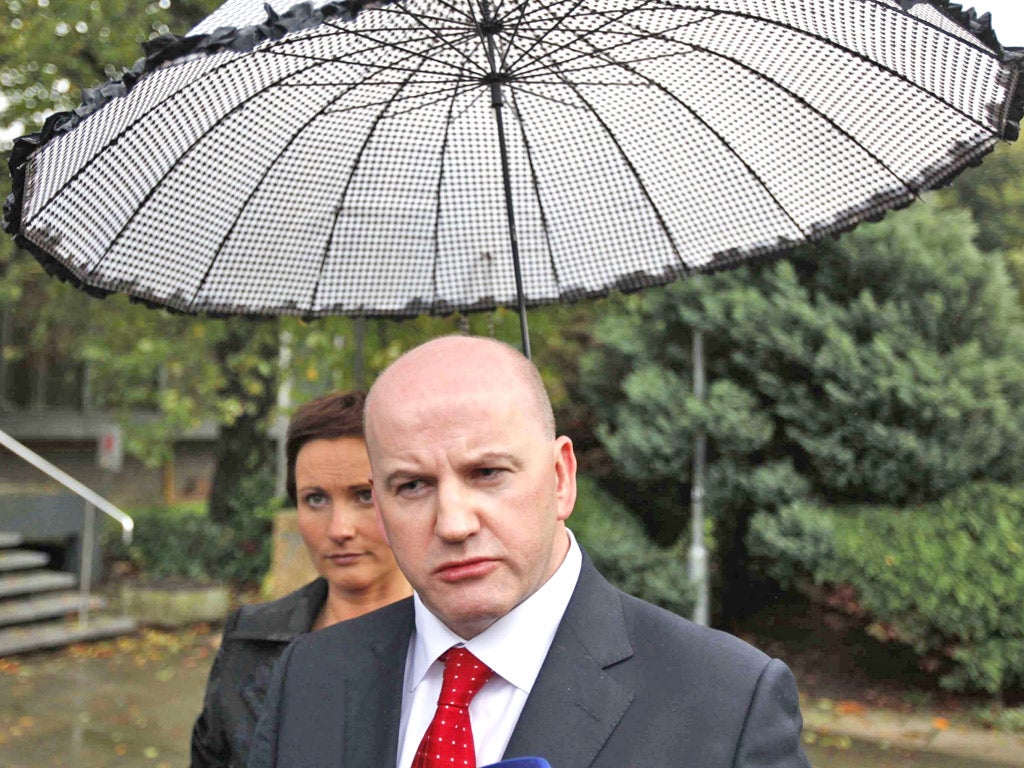Storm envelops favourite in Irish presidential race
Row over €5,000 Fianna Fail donation may dash businessman's chances of victory in today's vote

Your support helps us to tell the story
From reproductive rights to climate change to Big Tech, The Independent is on the ground when the story is developing. Whether it's investigating the financials of Elon Musk's pro-Trump PAC or producing our latest documentary, 'The A Word', which shines a light on the American women fighting for reproductive rights, we know how important it is to parse out the facts from the messaging.
At such a critical moment in US history, we need reporters on the ground. Your donation allows us to keep sending journalists to speak to both sides of the story.
The Independent is trusted by Americans across the entire political spectrum. And unlike many other quality news outlets, we choose not to lock Americans out of our reporting and analysis with paywalls. We believe quality journalism should be available to everyone, paid for by those who can afford it.
Your support makes all the difference.The result of today's Irish presidential election could hinge on one word – "envelope" – that has the potential to dash the hopes of the contest favourite.
A dynamic entrepreneur, Sean Gallagher, looked to be striding purposefully towards victory following a campaign that emphasised his business expertise and personal independence. But in the past few days he has been forced to concede in a television debate that an envelope containing a cheque for €5,000 (£4,300) may have changed hands as he solicited donations for Fianna Fail, Ireland's most toxic political party.
At a stroke his independent image became tarnished by association with the party whose mixture of incompetence and sleaze are widely regarded as having wrecked the economy.
The situation has not been helped by the fact the businessman involved, Hugh Morgan, was some years ago convicted of tax evasion and smuggling fuel across the Irish border.
Mr Morgan issued a statement confirming he gave a cheque to Mr Gallagher, who had invited him to a Fianna Fail fundraiser. He said: "In return for the €5,000 donation I was promised a private audience with the Taoiseach (Prime Minister) and I would get a photograph taken with him."
Mr Gallagher claims he has been the victim of a smear campaign, declaring: "This was a political assassination attempt by Martin McGuinness and Sinn Fein. The person in question, Hugh Morgan, is a convicted criminal and he loaded the gun while Martin McGuinness pulled the trigger."
Mr Gallagher's spokesman previously insisted that "at no point did he actively solicit any donations". He has since been accused of changing his story.
Fianna Fail is indelibly identified with "the politics of the brown envelope", a phrase signifying the purchase of favouritism through donations.
When Mr Gallagher uttered the word during a television debate he released a flood of memories of the bad old days. He had previously admitted some Fianna Fail connections but steadfastly downplayed them and criticised the party's economic record.
In polls, he has of late been miles ahead of his nearest opponent, Michael D Higgins of the Irish Labour party.
Mr Gallagher, who experienced a stellar rise earlier in the campaign, is now undergoing a meteoric plunge.
The question is whether the revelations, so late in a long and volatile campaign, will deny him victory. Dublin bookies make Mr Higgins favourite.
Most of the damage to Mr Gallagher's standing came from Sinn Fein's Mr McGuinness, who is third favourite. He opened his campaign strongly but has since faded amid a barrage of criticism of his past record in the IRA.
His repeated assertions that he left the violent organisation in the mid-1970s have not been taken seriously.
Mr Gallagher, whose campaign was initially confident and composed, struggled on TV to respond to the Sinn Fein leader's allegation that he collected the cheque for Fianna Fail. He later said he had been "shell-shocked" by the charge.
Meanwhile, Mr McGuinness looks set to finish third – something of an achievement for a party that until recently was only on the fringes of the Republic's political mainstream.
This means that in this election at least it has displaced Fianna Fail, once the Republic's largest party, whose standing is so low it decided against contesting the election at all.
But Sinn Fein probably had even higher ambitions when it gave Mr McGuinness a temporary transfer from northern politics and pitched him into a battle in which some speculated he had an outside chance of victory. Fine Gael, the largest party in the ruling Dublin coalition, has had a dismal showing, its candidate Gay Mitchell languishing towards the bottom of opinion polls. He is currently an 80-1 outsider.
While the presidency has no executive powers, the two women who have held the post over the last two decades, Mary Robinson and Mary McAleese, have greatly expanded its profile and symbolic role.
Join our commenting forum
Join thought-provoking conversations, follow other Independent readers and see their replies
0Comments